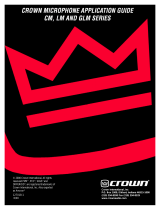Page is loading ...

USER GUIDE
To take full advantage of the superb features of the DM-90, and to enjoy long
and trouble-free use, please read this User’s Guide carefully.
DM-90 Jumbo Kick Drum/Instrument Microphone
Your DM-90 microphone was carefully packed at the factory in a
carrying case designed to protect the unit during shipping.
Please examine your microphone before using and retain the
external shipping package for reuse should you ever need to
return your microphone for servicing. A foam padded plastic
carrying case is provided for safe, convenient transport and
storage.
STANDARD ITEMS SUPPLIED
OPTIONAL ACCESSORIES
• DM-90 microphone
• User Guide
• Warranty card
• Foam padded plastic carrying case
FEATURES
Congratulations on purchasing the Nady DM-90 Jumbo Kick
Drum/Instrument Microphone. Capable of handling high sound
pressure levels without distortion, the DM-90 microphone is ideal
for live or recording close-miking of all types of drums and
percussion instruments, and also for accurate sonic reproduction
of brass, woodwind and other instruments producing high sound
fields.
• Large-size housing especially acoustically designed for the most
accurate reproduction of the extended low frequencies of kick
drums and other bass instruments and amps.
• Large diaphragm dynamic element with excellent attack and
punch for truest sound
• Supercardioid pattern for ultimate feedback rejection
• Ultra-high SPL capability-ideal for live or recording close-miking
of all types of drums and percussion instruments, and also for
accurate sonic reproduction of brass, woodwind and other
instruments producing high sound fields
• Rugged die-cast body with internal shock mount and hardened
steel grille
• XC-10 — 10’ XLR to XLR mic cable
• XC-20 — 20’ XLR to XLR mic cable
• XC-25 — 25’ XLR to XLR mic cable
• XC-50 — 50’ XLR to XLR mic cable
PRECAUTIONS AND CARE OF YOUR DM-90
• The microphone should never be dropped or subjected to extreme shock. Store only in a padded case to protect it during transport.
• Keep the microphone away from extremely high temperatures (above 140˚F or 60˚C) and humidity. Avoid leaving the microphone in
direct sunlight for long periods of time.
• When using the microphone outdoors, avoid getting it wet.
• After use in a high-moisture application such as a stage performance, wipe off the microphone with a dry cloth and permit it to air dry.
Do not store the unit in a closed space (e.g., a plastic bag) until all moisture has evaporated.
UNPACKING, INSPECTION,
STORAGE AND TRANSPORT

SERVICE
(U.S.) Should your Nady microphone require service, please contact the Nady Service Department via telephone at (510) 652- 2411 or
e-mail at service@nady.com. (INTERNATIONAL) For service, please contact the Nady distributor in your country through the dealer
from whom you purchased this product.
FREQUENCY RESPONSE
Date of purchase_____________________________________________________________________________________________
Dealer’s Name ______________________________________________________________________________________________
Street______________________________________________________________________________________________________
City ____________________________________ State _____________________ Zip _____________________________________
Note: Do not attempt to service this unit yourself as it will void your warranty.
01/26/04
Specifications and design subject to change for improvement purposes without prior notice.
SPECIFICATIONS
CARTRIDGE TYPE ............................................................................. Moving coil dynamic
POLAR PATTERN .............................................................................. Unidirectional (Supercardioid)
FREQUENCY RESPONSE ................................................................. 20Hz to 10KHz
SENSITIVITY (0dB=1V/Pa @ 1kHz) ................................................... -58dB,±3dB
OUTPUT IMPEDANCE (@ 1kHz) ....................................................... 150 Ohms, ±30%
DIMENSIONS ..................................................................................... 2.5" x 4.75" ( 64 mm x 121 mm)
WEIGHT .............................................................................................. .86lb. (390g)
-30
-40
-50
-60
-70
(dB)
20 50 200 500 2K 5K 20K
USING YOUR DM-90
The DM-90 can be used with any standard mixer, powered mixer/
amplifier, or mic preamp. Using either an XLR to XLR or XLR to
1/4" phone plug low impedance cable, connect the female XLR
end to the DM-90 and the other end (male XLR or 1/4" phone
plug, as appropriate) to your equipment.
The DM-90 can be mounted on a microphone stand with the
integral mic holder mount supplied. Depending on the threading of
the mic stand you are using, you may need to remove the
threaded adapter from the mic holder.
Be aware of the proximity effect (an increase in bass response)
when the mic is placed close to the instrument. This may or may
not be desirable. Experimenting with the position of the mic with
respect to the audio source will ensure the optimum results you
are seeking in any given application.
If the microphone is placed too near a speaker during live stage
use, an unpleasant howling effect (acoustic feedback) may occur.
Although all microphones are prone to feedback to some extent,
with a unidirectional polar pattern are specially designed to accept
only signals from the audio source directly in front of the mic
cartridge. Thus, the cardioid pattern of the DM-90 ensures that it
will deliver only the desired audio in front of the mic, rejecting the
unwanted audio from the rear, even in noisy ambient conditions
with high sound pressure levels from the P.A. and monitor
speakers. This means that feedback will be greatly minimized
with the DM-90 in all live performance miking applications.
Some useful ways in which to totally eliminate annoying feedback
include: experimenting with mic positions with respect to the
speakers, decreasing speaker volume (whenever possible), and
adjusting the equalization of the mic audio with the mixer.
/
